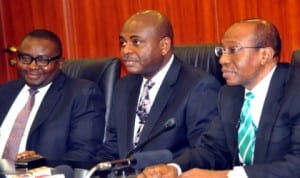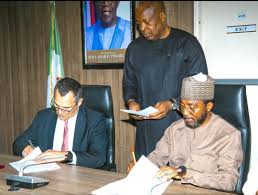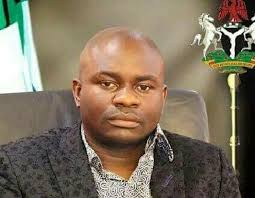News
WHO Approves Experimental Ebola Drugs

Governor, Central Bank of Nigeria, Mr Godwin Emefiele (right), addressing participants at the Monetary Policy Committee meeting in Abuja, recently. With him are Deputy Governor, Finance System Stability, Dr Kingsley Moghalu (middle) and Deputy Governor, Corporate Services, Mr Adebayo Adelabu. Photo: NAN
The World Health Organization (WHO) yesterday authorised the use of experimental drugs to fight Ebola as the death toll topped 1,000 and a Spanish priest became the first European to succumb to the latest outbreak.
The declaration by the United Nations’ health agency came after a United States company that makes an experimental serum called ZMapp said it had sent all its available supplies to hard-hit countries in West Africa.
“In the special circumstances of this Ebola outbreak it is ethical to offer unregistered interventions as potential treatments or prevention,” WHO Assistant Director General, Marie-Paule Kieny told reporters in Geneva, following a meeting of medical experts on the issue.
The epidemic, described as the worst since Ebola was first discovered four decades ago, has killed 1,013 people since early this year, the WHO said.
Cases have been limited to Guinea, Liberia and Sierra Leone, which account for the bulk of victims, and Nigeria, where two people have died.
Elderly Spanish priest, Miguel Pajares, who became infected while helping patients in Liberia, died in a Madrid hospital yesterday, five days after being evacuated.
He had been treated with ZMapp, which failed to save him but has shown positive effects on two US aid workers also infected in Liberia.
There is currently no available cure or vaccine for Ebola, which the WHO has declared a global public health emergency, and the use of experimental drugs has stoked a fierce ethical debate.
Despite promising results for the ZMapp treatment, made by private US company, Mapp Biopharmaceutical, it had only been tested previously on monkeys.
ZMapp is also in very short supply but the company said it had sent all available doses to West Africa free of charge after an outcry over its use on foreign aid workers.
“Any decision to use ZMapp must be made by the patients’ medical team,” it said, without revealing which nation received the doses, or how many were sent.
Kieny said WHO had been told three doses were sent to Liberia.
While the ZMapp stock has been exhausted for now, Kieny stressed there were other “potential therapies and vaccines … considered very serious alternatives.”
She said the WHO would convene a new meeting of experts at the end of August to discuss their use.
Two possible vaccines were moving rapidly towards clinical trials, she said, voicing optimism that one could be made widely available by year-end, maybe as early as November.
Kieny described the lack of vaccines and treatments for Ebola as “a market failure,” pointing out that plenty of drugs had been developed “to a point”, but companies had not footed the bill for the more expensive clinical trial process since the virus was “typically a disease of poor people in poor countries where there is no market.”
“This is an opportunity to right a wrong of history,” she said.
The use of unauthorised drugs that had proven safe and effective in monkeys could be a “potent asset” in the fight against Ebola, she said.
But strict criteria applied, including the need for full transparency, and for informed consent from patients — or their families if they are unconscious.
Kieny also stressed the “moral obligation” to collect and share all data generated from their use to help speed up the production of authorised drugs.
Panic has gripped the impoverished West African countries ravaged by the disease, with drastic containment measures causing transport chaos, price hikes and food shortages, and stoking fears that people could die of hunger.
Numerous countries around the globe have imposed emergency measures, including flight bans and improved health screenings.
In Liberia a third province was placed under quarantine on Monday, and state officials were banned from travelling abroad for a month, while those outside the country were ordered home.
Sierra Leonean President, Ernest Bai Koroma, expressed his “utter dismay” at the “slow pace” of the international community in responding to the outbreak.
Eight Chinese medical workers who treated patients with Ebola have been placed in quarantine in Sierra Leone, but Beijing has not said whether they were displaying symptoms of the disease.
In addition, 24 nurses have been quarantined, health officials said, while a physician had contracted Ebola but was responding well to treatment.
The nation’s sole virologist, who was at the forefront of its battle against the epidemic, died from Ebola last month.
Countries around the world were on alert, with Japan saying it was evacuating two dozen staff from Guinea, Liberia and Sierra Leone.
In Senegal, a newspaper editor was detained by police for spreading “false information” after his paper claimed there were five Ebola cases in the country, which authorities have denied.
However, some private hospitals in Lagos yesterday rejected treating patients who visited them with symptoms of fever as part of measures they were taking to prevent contracting the Ebola Virus Disease.
A visit to some hospitals in Lagos metropolis showed that nurses and other health workers, including cleaners were seen wearing face mask and gloves while attending to patients.
Also, some of the health facilities were compelling patients to wash their hands and apply sanitisers before proceeding into their building.
Some of the hospitals visited included Jaycee Hospital, Prime Hospital, Lifeline Children’s Hospital and Providence Hospital.
A Neurologist at Jaycee Hospital, Dr. Francis Ojini, said that his hospital did not attend to patients who had with fever.
Ojini said that it became necessary as health workers were at greater risk of contracting the virus.
“Health workers are the first to be in contact with patients who visited the hospital and so it is necessary we take precautions.
“For now, any illness that has to do with fever is not being attended to as we are trying to be careful because of the new development of the Ebola disease.
“If there is need, we refer patients we feel we cannot treat. We hope we are able to curtail the spread in order to save lives,” he said.
A nurse at the same hospital, who pleaded anonymity, said that nurses wore face mask and gloves when any patients visited the facility.
She said: “We are protecting ourselves from contracting a deadly disease that has no drug or vaccine at the moment.”
Also speaking, the Medical Director, Lifeline Children’s Hospital, Dr. Uche Owowo, said that his hospital was making hand sanitisers available for patients.
Owowo urged the Federal Government and other civil organisations to intensify awareness programmes to educate the masses about the disease.
“Many people still need to know more about the disease, how it can be contracted and how to prevent being infected.
“I believe educating people and making the facilities available and accessible will encourage people to be cautious,” he said.
Efforts to speak with the medical directors and other health workers of Prime Hospital and Providence Hospital proved abortive as they refused to comment.
Meanwhile, the Africa Grassroots Empowerment Organisation (AGEO), has offered the services of its members who are medical personnel to assist the government in the management of Ebola virus outbreak in the country.
The President of the group, Gomene Namene, said his association has 150 medical personnel who are willing to work with the government to contain the spread of the disease, adding that the specialization of the volunteers cuts across the spectrum of medicine.
Namene, who said this at a media briefing in Abuja yesterday, stated that the Ebola virus appeared to be spreading globally, adding that it is necessary to work with all volunteers and medical personnel to combat the disease.
According to him, the group would soon commence its street campaign to sensitize the people on how to stay safe alive and protect themselves from harm.
He said, “We are mindful of the deadly Ebola disease that has broken out in some African countries; as we embark on the sensitization campaigns, our 150-member team of medical experts will be educating the populace on the best ways to live free and safe from Ebola disease.
“We are therefore calling on government to partner with our organisation in order to achieve this.
“Namene said it was interested in working to keep the nation united, and called on the Independent National Electoral Commission to put an end to what it called electoral corruption in the country”.
He challenged Nigerians to learn to conduct themselves peacefully during elections, noting that everyone must do everything within the confines of the law to ensure transparent and free electoral process.
News
FG Targets Production Of Locally Made Vehicles By Dec
The Minister of Industry, Trade and Investment, Dr Doris Uzoka-Anite, has affirmed that Nigeria now has the capacity and materials to manufacture Made-In-Nigeria cars for local use and export.
With the enabling environment being provided by the government, she said manufacturers should be held responsible if the cars are not rolling out by December 2024.
Currently, Nigeria produces less than 10 per cent of the vehicles used in the country.
Last year, Nigeria’s vehicle assembling industry, estimated to be worth around N302billion, tanked to a new low due to increasing production costs and weakened demand for locally assembled automobiles.
According to the Manufacturers CEOs Confidence Index, activities of motor vehicles and miscellaneous assembly deteriorated further below the benchmark (50 points) from 48.6 to 46.7 points.
But speaking at the Automotive Component Manufacturers meeting in Abuja, she noted that the automobile industry is faced with both challenges and opportunities.
A statement issued last Friday by the Director of Information and Public Relations, Adebayo Thomas, said, “In a significant move aimed at fostering sustainable growth and development in Nigeria’s automobile industry, the Federal Government has issued a clarion call to all stakeholders, including manufacturers, dealers, regulatory bodies, and other players in the automobile ecosystem.
“The call comes as part of a broader strategy to enhance the sector’s contribution to the nation’s economy.”
Encouraging the stakeholders to key into the Nigerian Automotive Development Policy, the Minister said, “As far as we are concerned, the auto industry is now set to go.
“We are counting on all stakeholders to make that happen. If we do not produce made-in-Nigeria cars before the end of this year (December), it will be your fault, because I am sitting down here giving you all the assurances that this administration has created the enabling environment to make sure that the auto policy kicks off.”
Anite emphasised the need for collaboration among manufacturers, dealers, regulatory bodies, and other players in the automobile ecosystem, saying by working together, they can address challenges, streamline processes, and drive innovation.
She also urged stakeholders to maintain high-quality standards across the board, including vehicle manufacturing, safety features, emissions control, and after-sales services.
Stringent adherence to quality, she said, will boost consumer confidence and attract investment.
The minister assured all that the government would continue to encourage increased investment in research and development, adding that, innovations in electric vehicles, fuel efficiency, and alternative energy sources are critical for long-term sustainability.
On local content, she also emphasised the importance of promoting local content by sourcing materials and components locally.
By doing this, she said, the sector can create jobs, reduce import dependency, and contribute to economic diversification
In his introductory comments, the ministry’s Permanent Secretary, Nura Rimi, emphasised the significance of team action and shared vision as outlined in the Nigerian Automotive Development Policy.
He also urged stakeholders that the country “will overcome obstacles and unleash the full potential of Nigeria’s automotive component sector.”
He encouraged NADDC and other stakeholders to use the chance to form alliances, explore new areas of collaboration, and devise ways to catapult the automotive components manufacturing industry to new heights of success.
The statement added, “The government’s charge underscores the pivotal role stakeholders play in shaping its trajectory. Their commitment to sustainable practices will drive Nigeria’s automotive sector towards a brighter and more prosperous future.
“Environmental Responsibility: Stakeholders are reminded of their environmental responsibilities. Sustainable practices, recycling, and eco-friendly manufacturing processes are essential for a greener future.”
News
Waive Tax On Electronic Imports, Women Engineers Appeal To Tinubu
The Association of Professional Women Engineers of Nigeria (APWEN), Lagos Chapter, has called on President Bola Tinubu to exempt the importation of electronic components from taxation for inventive engineers.
Chairman of APWEN, Ms Atinuke Owolabi, said this a in statement yesterday in Lagos, in commenration of the 2024 World Creativity and Innovation Day, with the theme: “Step Out and Innovate”.
The Tide source reports that World Creativity and Innovation Day is a global UN Day, celebrated on April 21, to raise awareness about the importance of creativity and innovation in problem solving.
This is with respect to advancing the United Nations’ sustainable development goals, also known as the global goal.
Owolabi explained that such a measure would significantly enhance technological progress, support local innovators, and elevate Nigeria as a leading hub for innovation globally.
She stated that in a world marked by dynamic challenges and unprecedented opportunities, creativity and innovation stand as the driving forces behind progress and transformation.
According to her, women engineers recognise the critical role that innovation plays in shaping our societies and driving sustainable development.
”On this occasion, we affirm our commitment to fostering a culture of creativity and innovation within our organisation and the broader engineering community.
”Together, let us step out, innovate, and inspire the next generation of women engineers to reach even greater heights of achievement and impact.
”We believe that by stepping out of our comfort zones and embracing new ideas, technologies, and approaches, we can unlock innovative solutions to the complex challenges facing our world today,” she said.
According to her, the theme: ‘step out and innovate’, serves as a call to action for women engineers everywhere to break barriers, challenge conventions.
She noted that it would also pioneer groundbreaking solutions that would propel them toward a brighter and more sustainable future.
Owolabi disclosed that in celebration of the World Creativity Day, APWEN Lagos had inaugurated an artificial intelligence club tailored for female engineering students and young engineers.
She said that the proactive initiative aimed to inspire and equip young engineers with cutting-edge technological insights.
Th chairman said, “Additionally, we already have a 200-capacity hall to set up a resource, technology, and innovation hub to empower women and girls in engineering.
”This endeavour serves as a catalyst for encouraging aspiring female engineers to embrace innovation and stay abreast of emerging trends in the field.
”APWEN Lagos stands united in its dedication to promoting diversity, inclusivity, and excellence in engineering.
“We encourage all female engineers to seize this opportunity to unleash their creativity, explore new frontiers, and make an indelible mark on the world.”
News
Pan-Igbo Group Hails Dangote Group For Reducing Diesel Price
A pan-Igbo group, Ndigbo Unity Forum (NUF), has commended the Chairman of the Dangote Group, Alhaji Aliko Dangote, and his management for reducing the price of diesel from N1,600 to N,1000 per litre.
The Tide’s source reports that diesel is the major fuel used by heavy duty vehicles and generating sets to transport goods as well as run industries across the country.
The President of NUF, Mr Augustine Chukwudum, told The Tide’s source in Enugu, yesterday, that Dangote’s timely response to suffering masses of Nigerians, going through hell to get a meal a day, “is highly commendable”.
According to Chukwudum, Nigerians need to appreciate the patriotism of Dangote since what he has done will go a long way in reducing prices of goods, especially food stuff which has gone out of the reach of the poor.
He called on Nigerians, who wish and pray always for the betterment of the country, to appreciate and thank God for answering their prayer through Dangote’s move.
“It is clear that if Dangote Refinery starts fully and gets all the crude oil needed from Nigeria, the prices of petrol, kerosene and diesel will further reduce.
“We commend President Bola Tinubu for being a listening President and supporting the Dangote Group on our crude oil needs.
“We appeal to Tinubu to encourage Dangote by providing the company with crude oil at a reduced rate as we have been demanding,” he said.
Chukwudum said that this move and subsequent further reduction, would bring industries in comatose back to life, jobs created for unemployed youths and reduction in crime as well.
“We call on governors of oil-producing Anambra, Imo and Abia States to bring investors, who shall build refineries in each of the states to refine thousands of barrels of crude in commercial quantities,” he said.
-

 Maritime3 days ago
Maritime3 days agoNPA Secures $700m Citibank Loan For Tin Can, Apapa Ports Rehabilitation
-

 News2 days ago
News2 days agoJAMB Sanctions Officials For Asking Candidate To Remove Hijab
-

 Opinion3 days ago
Opinion3 days agoCautious Optimism As Naira Rebounds
-
News2 days ago
Waive Tax On Electronic Imports, Women Engineers Appeal To Tinubu
-

 Sports3 days ago
Sports3 days agoCRSG Doubles Subvention For Rovers FC
-

 Maritime3 days ago
Maritime3 days agoWestern Marine Command Customs Gets New Boss
-

 News2 days ago
News2 days agoNDLEA Arrests Three Wanted Kingpins, Seizes 51.90kg Heroin
-

 Politics3 days ago
Politics3 days agoNEC Meeting: PDP’ll Wax Stronger – Farah Dagogo

